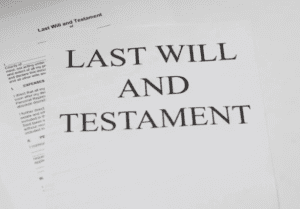Procedure for Objecting to a Will
If you are considering filing an objection to a will and do not know exactly what is required, this article is for you. Anat Levi, a lawyer specializing in inheritance law, explains here about the procedure for objecting to a will.
The Right of the Testator to Decide How to Dispose His Properties
A will is a document in which a person determines the distribution of his properties after his death. According to the Israeli inheritance laws, the testator has freedom of volition regarding how his properties will be distributed, provided that the will complies with the provisions of the Succession Law, 1965. The principle of honoring the wishes of the deceased is very important in Israeli law, and it is taken into account by the courts when they are required to decide on the validity of a will.
However, the Succession Law sets a number of restrictions on the contents of a testament. For example, Section 34 states that an illegal or immoral will is void. In such a case, public policy and other values override the testator’s freedom to dispose of his estate.
Probate Order
 To execute the will and act upon it, a probate order is required. Any interested party may file a petition with the Registrar of Inheritance Affairs to probate a will. Before issuing the requested order, the registrar must publish a notice of the probate petition in the press and in the court records and wait 14 days from the date of publication of the notice to allow filing of objections.
To execute the will and act upon it, a probate order is required. Any interested party may file a petition with the Registrar of Inheritance Affairs to probate a will. Before issuing the requested order, the registrar must publish a notice of the probate petition in the press and in the court records and wait 14 days from the date of publication of the notice to allow filing of objections.
The question arises, what exactly are these objections and how is it possible to object to a will?
Two Ways to Object to a Will
An objection to a probate may be filed before the order is issued. Naturally, if the order has already been issued, it is not possible to file an objection; instead, a request to revoke the probate must be filed.
Objecting to a Probate Order
The first way to object to a will is to file an objection to a petition for probate, stating the grounds for objection, within the 14-day objection period after the registrar publishes the notice of probate in the court records and the press. In special cases, it is possible to request an extension of the period for filing objections. In most cases, the registrar will accept the request and extend the period.
The objection to the probate order must be filed in writing. The objector must pay a fee in the amount of 972 ILS (as of 2020) and include in his objection specific allegations as to the reasons the will should not be admitted to probate and the claims that he wishes to bring before the court in this matter.
Appropriate documents supporting the allegations set forth in the objection must be filed, as well. The objection must be written in accordance with the rules and regulations, and an affidavit must be filed with the objection verifying the facts claimed in it. If the objector is represented by a lawyer, a power of attorney must also be filed with the objection.
The objection and its appendices must be submitted in several copies, so that the court as well as the parties to the proceedings will have copies. Upon receipt of the objection, the Registrar of Inheritance Affairs will refer the case to a family court, who will decide on the matter.
In the case that the period for objection has passed and a probate order has already been issued, there is another way to object, namely, revoking the probate order.
Revoking a Probate Order
In principle, a probate order that has already been issued is binding and final, like a judgment. However, the law provides for revocation of a probate. The possibility of amending or revoking a probate is granted to the Registrar of Inheritance Affairs and the courts if claims or facts are brought before them that were not presented prior to the issuance of the probate order.
Section 72 of the Succession Law, on the amendment and revocation of an inheritance order and probate order (Amendment No. 9, 1998), states:
(a) The Registrar of Inheritance Affairs or the Court that issued an inheritance order or probate order may, based on the petition of an interested party, amend or revoke the order based on facts or pleadings that were not available at the time the order was issued originally; however, if the Registrar of Inheritance Affairs decides not to take into account any fact or pleading the petitioner could have brought before the order was issued, or could have brought afterwards, and did not do so at the first reasonable opportunity, it shall transfer the petition to the Court.
(b) Where an inheritance order or probate order is amended or revoked according to subsection (a), the Registrar of Inheritance Affairs shall give public notice thereof and to the heirs at law, or to the beneficiaries according to the will.
Thus, it is sometimes possible to object to a will even after the probate order has been issued.
Where Does One Turn to Revoke an Inheritance Order?
As stated in subsection (a), the amendment or revocation of an order shall be made by the entity that issued it, that is: if the registrar issued the order, the registrar must be contacted to revoke or amend it. If the court issued the order, the petition for revocation of the order must be submitted to the court.
However, the Registrar of Inheritance Affairs will forward the petition to the court in cases where the petition is based on facts or pleadings that could have been brought before the registrar but were not brought before the order was issued. The court will look into the matter and decide whether the order should be amended, revoked or the petition denied.
Pursuant to the statute, petitions for amendment or revocation of a probate are exceptional and should be approved sparingly. The court will not easily revoke a probate order that has already been issued. Moreover, the process of revoking a probate is much more difficult than objecting to the probate before it has been issued.
Grounds for Objecting to a Will
Filing an objection to a probate order is a fairly common practice, which takes place when the objector believes that the deceased’s real wishes will not be respected if the probate is issued or, if the probate has already been issued – if it is not revoked. Grounds for revocation of a will may vary depending on the circumstances.
There are two types of grounds for objecting to a will: formal grounds, when a will was not drafted according to the requirements of law, and grounds based on the content of the will and the circumstances under which the testator made his will.
A will does not follow the requirements of law if, for example, it was not handwritten entirely by the testator, was made before two witnesses but does not bear their signatures, or was made before an authority by someone other than the testator himself.
Problems with the content of a will or the circumstances under which it was made occur when the will is written under pressure, threat, coercion, or because the testator was tricked or subjected to undue influence. Another possible problem may occur if one of the beneficiaries according to the will is present during the making of the will, thereby affecting the testator’s free will in making decisions.
The importance and effect of objecting to a will is great since, if the court decides to accept the objection, it will declare the will to be revoked.
Contact Us
Since this is a complex and critical matter, it is advisable to consult a lawyer who specializes in family law and who has experience with wills and inheritances. It is important to plan your moves in advance and know whether to file an objection, what to write in the objection, what grounds for objection should be stated, what to emphasize, etc. This is also the case if the objection time period has passed and you want to revoke the probate. A lawyer who is experienced in filing objections and petitions for revocation will assist you and recommend how to act in your circumstances.
Our law firm deals with family and inheritance law, mediation and legal representation of heirs in inheritance disputes. The firm’s lawyers have extensive experience in drafting wills, filing petitions for inheritance and probate orders, and filing objections to probate and inheritance orders.
מאמרים מומלצים

